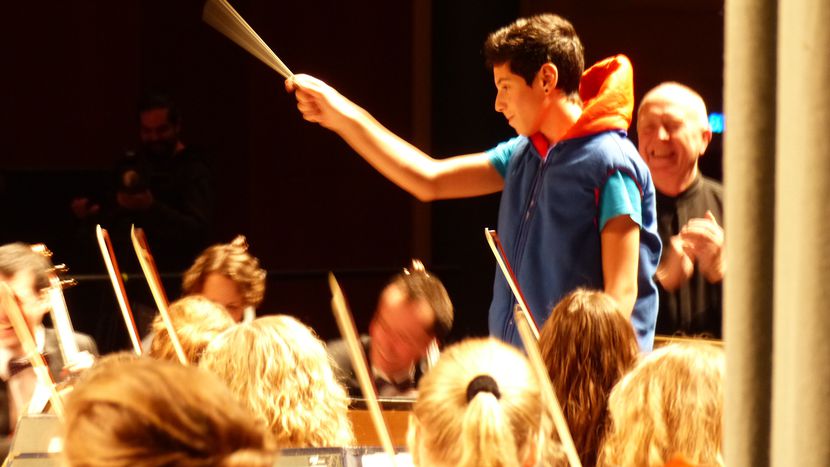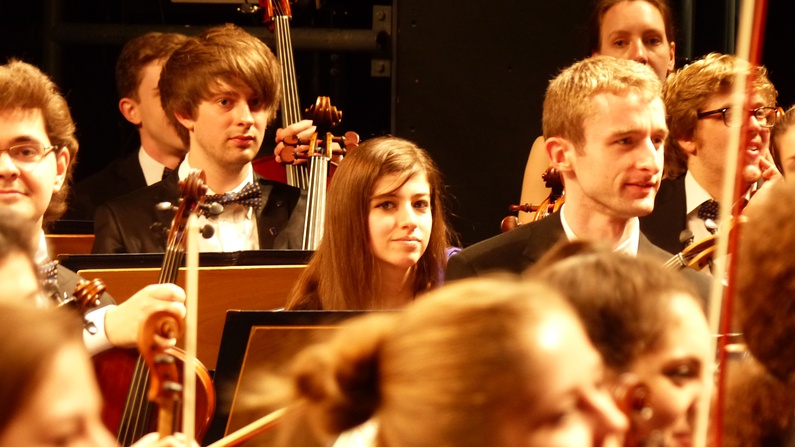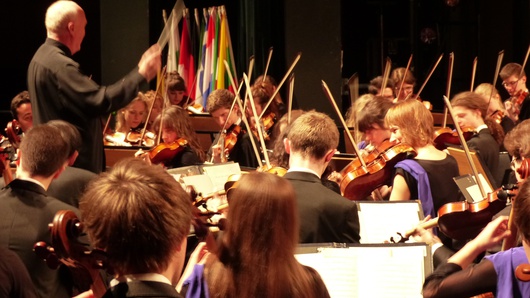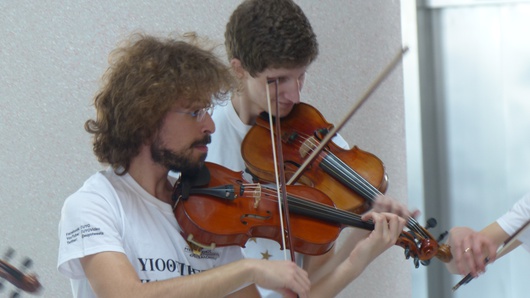
Harmony in the EU? The European Union Youth Orchestra Shows us how
Published on
Translation by:
Abigail WatsonMost of the EU Institutions may still have some fine-tuning to do, but for the "European Union Youth Orchestra", it is part of everyday life. Since 1976 the orchestra has given gifted young musicians from all EU Member States the opportunity to tour with challenging schedules and renowned professionals. Along the way, they also demonstrate how harmonious Europe could be.
Dominik from Germany, Babis from Greece, Patrycia from Spain, and Vilém and Radka from the Czech Republic all have a rigid schedule. As members of the EUYO they didn't come to Greece for the swimming opportunities, but to complete a remarkable programme during their one-week stay in Thessalonica: Rehearsals, a concert in the evening, two the following morning for children and young people and a trip to a nightclub in the evening. In addition, they explain to groups of schoolchildren exactly what kind of instruments they have and how they work.
They all have one thing in common: They play in the European Union Youth Orchestra (EUYO), composed of up to 140 young up-and-coming musicians from (by now) all 28 Member States of the European Union, who tour twice a year. This spring they travelled to Abu Dhabi, where no less than Vladimir Ashkenazy was on the conductor's stand and EUYO-Alumni and star cellist Gartier Capucon performed with the orchestra. The opening concert took place in Thessalonica where, besides the music, it was all about coming together.
 In response to my questions concerning their attitude to Europe, whether this was an issue when they auditioned for the orchestra and whether they see themselves as European or not, at first I receive a confused look. 'It's really just about the music,' says Babis, a music teacher from Athens. 'It's simply a good orchestra. In Graz, where I study, we always play with people from all over the world, so for me it's completely normal', adds Patrycia, a cellist from Madrid. Taking Europe for granted like this surprises me, and Charlotte, PR person and organisational pivot and linchpin for the orchestra notices my disappointment: 'We always say that the orchestra is a metaphor for how the EU should work. It creates harmony and shows the best of all European nations.'
In response to my questions concerning their attitude to Europe, whether this was an issue when they auditioned for the orchestra and whether they see themselves as European or not, at first I receive a confused look. 'It's really just about the music,' says Babis, a music teacher from Athens. 'It's simply a good orchestra. In Graz, where I study, we always play with people from all over the world, so for me it's completely normal', adds Patrycia, a cellist from Madrid. Taking Europe for granted like this surprises me, and Charlotte, PR person and organisational pivot and linchpin for the orchestra notices my disappointment: 'We always say that the orchestra is a metaphor for how the EU should work. It creates harmony and shows the best of all European nations.'
"We don't sit around and discuss politics"
 That sounds more like a well-worded answer, although it is not the theoretical idea which gives the orchestra its particular aura, but rather the relaxed interaction among the musicians. Politics is a side issue. To a greater degree, they put into practice what Brussels so desperately strives for: direct exchange, encounters and (professional) cooperation. 'We see a lot when we're travelling', says contrabassist Dominik, who would define himself as Bavarian rather than German. 'And in doing so, they exchange views', adds Charlotte. 'We don't sit around and discuss politics. It wouldn't make any sense. But I notice how they learn from one another on a cultural level. They ask questions, for example about all the graffiti we see here in Greece, and they get answers. And then an intercultural dialogue is born.'
That sounds more like a well-worded answer, although it is not the theoretical idea which gives the orchestra its particular aura, but rather the relaxed interaction among the musicians. Politics is a side issue. To a greater degree, they put into practice what Brussels so desperately strives for: direct exchange, encounters and (professional) cooperation. 'We see a lot when we're travelling', says contrabassist Dominik, who would define himself as Bavarian rather than German. 'And in doing so, they exchange views', adds Charlotte. 'We don't sit around and discuss politics. It wouldn't make any sense. But I notice how they learn from one another on a cultural level. They ask questions, for example about all the graffiti we see here in Greece, and they get answers. And then an intercultural dialogue is born.'
music and europe going hand in hand
 This morning, classes of schoolchildren are being hosted in the concert hall in Thessalonica, having been invited to a special event by EUYO. A host introduces the individual nations of the orchestra. Frenetic applause for the Greek musicians, scattered boos for the Germans. Even among Greeks younger than 16, the crisis management of the German government has made itself felt.
This morning, classes of schoolchildren are being hosted in the concert hall in Thessalonica, having been invited to a special event by EUYO. A host introduces the individual nations of the orchestra. Frenetic applause for the Greek musicians, scattered boos for the Germans. Even among Greeks younger than 16, the crisis management of the German government has made itself felt.
But then the music has its say and dissolves everyday politics into euphony. A boy and a girl from the audience are called up to the stage and give conducting a go. The symbolism of the initiative is found when one considers the backdrop; we are talking about a country belonging to a lost generation where youth unemployment has gone beyond the 60% mark. After the concert the musicians split up and show their instruments to individual groups of schoolchildren. 'They thought that up themselves', explains Charlotte, while the children gaze at the violins and cellos, spellbound, or delight in the preposterous sounds people can make with wind instruments.
J.N. Hummel's Trumpet Concerto interpreted by the European Youth Orchestra (2012).
The EUYO is a talent pool which combines artistic professionalism with a sense of responsibility for culture and society. Far from the political bandstand of Brussels, Berlin or London, the young musicians are living out a reality which is exemplary for what Europe could be. Their interactions with one another contain no contradictions between the various national and regional identities and the European concept. 'When I'm in Spain, I feel like a European, and when I'm abroad I see myself as Spanish', explains cellist Patrycia during the interview. One thing above all is clear: Politics is not simply an administrative deed; first and foremost it emerges when cooperation and togetherness are experienced.
This article was first published on 28th April 2014 at www.eudyssee.net.
Translated from Einklang in der EU? Das European Union Youth Orchestra zeigt wie



